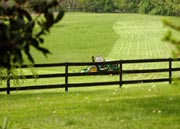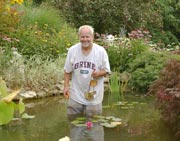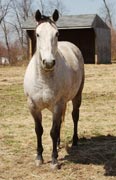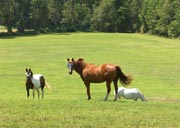 |
|||||||||||||
|
Volume 12, Issue 32 ~ August 5-11, 2004
|
|||||||||||||
|
A Farmer’s Tale
When we walked outside, I looked up at the sky. It seemed a very farmer-like thing to do. Downy, powder puff clouds drifted above us that windy afternoon. I wondered if it boded good or ill. Phil and I were leaving our quiet suburban life on a cul de sac and moving to a 16-acre horse farm. We’d owned horses for nearly 13 years but had always boarded them at someone else’s farm. In other words, we didn’t know what we were getting ourselves into. summer We moved to the farm in June and quickly learned that farmers need a tractor. That was easy enough, except for all the attachments that go with the tractor. There’s the bush hog for cutting the pastures; the finish mower for cutting the lawn; the sprayer to control the weeds; the seeder for spreading fertilizer and pasture-mix grass seed; the manure spreader that slices and dices manure from the stalls and tosses it about the pastures; the harrow for breaking up the manure the horses drop in the pastures; the box spreader for leveling the paddocks, round pens and riding arena; the front loader for hauling things like manure, hay and rocks around the farm; and the counter weight to keep the tractor from tipping forward when using the front loader. Along with all that equipment came the constant danger of losing a finger or cutting off a toe. But we were brave and careful. So far, only small amounts of blood have been sacrificed. There was much to learn, but the horses didn’t stop eating, the grass didn’t stop growing and the weeds didn’t wait to go to seed. So we got to work, mucking stalls, mending fences, cutting down trees, weeding, mowing, picking up rocks from the pastures and feeding, watering and bathing the horses. Our hands became callused, we lost weight, got poison ivy and tick bites and were zapped by the electric fence. I tried to look on the bright side. No mosquito bites, but that was because of all the bats swooping down over our heads at night. Making Hay Yet I was still a lawyer. During the week, I sat at a desk, staring at a computer. And Phil was commuting nearly 100 miles every day. Only our evenings and weekends were spent in jeans, old T-shirts and work boots. Hay season came along to save us from feeling like pretenders. A friend told me that we would need at least 100 bales of hay per horse to see our herd through the winter. I started calling hay farmers. “It’s been so wet,” one farmer said, “I don’t know when I’m going to cut.” “My fields are soaked. The grass is laying down,” said the next farmer. “We’re supposed to have a dry weekend. Give me your number and I’ll call you if I cut,” said another. Every morning, I checked the weather report. Would there be enough days without rain for the farmers to cut the hay, let it lie in the field to dry and then bale it? I regularly glanced out the window at work, hoping to see sunshine. Finally, the farmers started cutting. Phil and I left work early and rendezvoused with Debbie and Wayne Grieves and Debbie’s son, Sean. We’d been horseback riding with Debbie and Wayne for years. For this, our first cutting, they’d agreed to help put the hay up in our barn. Next cutting, we’d be putting hay up at their farm. We drove out into the hay field. I didn’t want to leave the air-conditioned cab of the pickup. It was early afternoon, no cloud cover, no shade: only the August sun. More than 200 bales were crammed into the farmers’ hay wagons. When the hay is baled, a mechanized thrower drops the bales into the wagons in a rough, haphazard fashion. We climbed onto the wagons and started wrestling these loose bales into shape. Hours and gallons of sweat later, the hay was stacked six bales high on the trailer and piled on the bed and over the cab of the pickup. Ropes ran in a cross-stitch pattern over the bales. With several sets of hands on the ropes, we pulled them tight and tied them off. Then we stood wondering how many bales we would lose. I felt greedy. Winter was coming and all that hay was mine. But mostly, I felt the pull of friendship. Debbie, Wayne and Sean would work until every bale was stacked neatly in our barn. There would be no time for dinner. When we turned up our driveway, the horses stood in the shade, tails swishing away the flies. They raised their heads to watch the hay rumble by, then returned to grazing. From atop the trailer, Wayne tossed a bale into the loft. I bent to pick it up. It weighed about 40 pounds and was bound tightly with thin nylon rope. On the sides, where the hay had been cut, it was prickly and sharp. I crammed my hands under the rope, heaved the bale up and rested it against my thighs. Gloves protected my hands and jeans saved my legs, but it was too hot for long sleeves. My arms were scratched and raw. Wayne had grown up on a farm in western Maryland, and he said that his father had called horses hay burners. I tried to laugh, but all I could do was cough and wheeze and spit out the hay dust coating my nose and throat. Then I itched and scratched at the tiny bits of hay that had worked their way into my pockets, down my shirt, into my boots and through my socks. Afterward, we sat on the truck’s tailgate and talked about our farms: How many more bales of hay we needed to put up. How much grain we would feed. Which horse is an easy-keeper, which requires extra care. In the spring, how thick the grass would come up, where we’d run that new fence line. In our barn now, more than 800 bales of hay mounted to the roof. I pulled a few strands from a bale, crumpled them in my hand and breathed in. Come winter, with the ground frozen and covered in snow, we would spread this hay on the pasture, the sweet smell of August rising from its flakes. Maybe, just maybe, I thought, we’re on our way to becoming farmers.
autumn
Phil is a fish lover. He spent his teen years in Hawaii, where he learned to Scuba dive. Ever since, he’s felt about fish the way most of us feel about fuzzy kittens or gangly puppies. Don’t ask me to explain it; I just know it’s there. When a co-worker of Phil’s took a new job, he simply closed the door to his office, leaving two goldfish behind. Eventually, someone found the starving fish in their filthy tank. They were black, covered with a fungus. Phil to the rescue. He bought a bigger tank, fed them and put tablets in the water to kill the fungus. I received daily updates on their condition. Once the goldfish were healthy, Phil started planning their escape. “I bet I could add them to the pond,” he said. Phil’s first purchases for our farm came from the fish pond store. Seven hours and hundreds of dollars later, he returned with cattails, water lilies, water grasses, tadpoles and snails. I guess I should consider myself lucky. He didn’t have to buy any fish because the previous owners at our farm had left a handful of koi and goldfish in the pond. “You need snails to clean the pond,” Phil explained as he unloaded the truck. He’d traveled with the soggy, saturated plants and other wet, slimy creatures in the cab of our pickup so they wouldn’t dry out in the sun. I tried to ignore the brown water running over the floorboards and out onto the driveway. “The grasses help filter the water,” Phil continued, “and the lilies shade the pond.” "What do the tadpoles do?” I asked. “I don’t know,” Phil answered. “But the guy at the store said I needed them.” I helped Phil lug his purchases to the pond. Then he climbed into the thigh-deep water, and I handed him the plants. I dutifully read through the pond book he had purchased to determine the appropriate depth for each of the pots while Phil set them on various sized rocks. My patience was well rewarded when Phil slipped on the slimy bottom and plunged full into the green water. The next day, he added his fungus-free goldfish to the pond. Over the ensuing months, they grew several inches. Again, I received regular updates on their progress. Fast Food Within hours of the heron’s appearance, Phil had stretched a protective net across the pond. His fish are safe for now. But we live on a farm. The food chain rattles right outside our door. It’s not often a pleasant sound. There’s an evil side to me that had been rooting for the heron. Can’t blame the bird for trying to catch an easy meal. How would you like to hunt for everything you eat? I prefer to look at the fish as a bit of heron fast food. Fly up, grab a goldfish and fly off. Kind of like a drive-through: a fly-by, as it were. Then again, the fish should have more of a sporting chance. It just didn’t seem fair with them stuck in that small pond. But on a farm, somebody is always living off somebody else. Our horses live off the grass, supplemented with the grain we feed them. Crows line the fences and swoop into the pastures to peck at the grains in the horse manure. Up at the barn, sparrows and black-capped chickadees flit between the stalls, searching for pieces of manure missed by the shovel and fork. Occasionally, one stops at a water bucket for a drink. Three cats enter the barn silently, crouched low to the ground. I keep telling them not to go after the birds. Mice and rats, which chew holes in the feed bags, are what they’re supposed to catch. But it’s usually a sparrow’s body that’s left at the door as a feline trophy. Don’t worry: what goes around comes around. In the spring, when the barn swallows return, they’ll dive bomb the cats and chase them back to the house. And, at night, foxes creep across the pasture, looking for a little cat meat. Raccoons amble from the woods, across the driveway and under the fence in search of grains the horses have dropped. How do they know when we’ve fed the horses in the pasture? When I gather up the feed pans, I hear a rabbit scream. It’s being hunted. By an owl? A fox? A coyote? Deer devour the flowers and shrubs. Blue jays, cardinals and doves growing fat at the feeder are prey to the hawk. Turkey vultures roost in the trees, waiting for something to die. Everyone’s looking for a free meal.
winter The Feeding Hour Sunday morning, early. No hint of dawn peeks through the blinds. I listen for the wind from last night and hear nothing. Beside me sleeps my little dog. I nudge her, hoping she’ll jump on me and disturb the stillness. She groans and curls tightly around herself. Well rested, I do not want more sleep. Yet I hesitate to rise and impose order and routine upon the day. Only when I think of the horses, by now alert and waiting, do I slip from underneath the covers. I dress without a light: wool socks, long underwear, jeans, turtleneck and sweater. Slithery shapes dart across the floor. It’s the cats, and the little dog jumps from the bed to chase them. My old dog presses his nose against my leg as if to tell me he’s above such absurdities. I look out the window. No moon, few stars. Downstairs, I turn on the outside lights and the coffee pot. The dogs are at the back door. I slip on their collars and they run outside barking. Boots, jacket, gloves and hat, I pull them on and step into the cold. My shoulders stiffen. Icy, dry remnants of an old snowfall crunch under foot. Halfway to the riding arena, I stop. Silence. Across the back pasture, lights from the neighbors’ houses. I wonder what scent the dogs are tracking and continue my walk. The heavy wooden door to the arena grumbles over the rollers, and I slide it open just enough to slip through. At the far end of the arena is the door to the barn, but I can’t see it. In front of me is blackness. The arena holds the night’s chill and wraps it around my neck. Every morning, this place gives me the creeps. I click on my flashlight. Before entering the barn, I call out a gentle, Good morning, guys, then push the door ajar. The combined smells of sawdust, hay, urine, manure and musty warmth greet me. It’s mildly sweet and I breathe it in, a healthy, working barn. The horses offer their welcomes. Blue gives me a high-pitched whinny; Dakota bellows a deep-throated nicker; Misty has a higher pitched, less heartfelt, nicker; Bo sounds more like a mule than I care to admit; Pokey doesn’t say much, but she swishes her tail and relieves herself, which sounds like a fire hose. When I turn on the light in the feed room, the barn cat rushes out of the office, mewing at me. She’s a stray my husband and I adopted, and I feed her first because her crying is more than I can bear. Now the horses tell me to hurry. They dance in their stalls, nicker and snort. Misty paws at the floor. Blue kicks at his stall door. Dakota tosses his head up and down, up and down. With a large scoop, I dole out the feed: wheat middlings, flaked corn, crimped barley, crimped oats, cane molasses. Sweet feed it’s called. The molasses has thickened in the cold, and the grains sound like pebbles striking the feed pans. I lug the pans from stall to stall, slide open the stall door, slip in the feed pan, latch the door shut. The horses take large gulps, and the grains spill from the sides of their mouths. Dakota, Misty and Bo, the older horses, chew with their eyes half closed and a back ankle cocked in relaxation. The young ones, Pokey and Blue, continue to dance and kick even as they eat. From the loft, I throw down a bale of our hay. It would be easier to load the bale onto the tractor, but I don’t want to listen to its diesel engine. I put it in the wheelbarrow and hike out to the pasture. There’s a hint of morning in the sky. Gray, dampness, maybe more snow. I cut the twine from the bale, and it breaks into small flakes. Bo, the ranking horse, will pin his ears and bare his teeth to chase the others from the hay. I scatter the flakes far apart so he will only be able to guard his rightful share. At the house, the old dog barks to be let inside. With his thick coat, he’s not cold. He just wants to be fed. “A little while longer, boy,” I yell, though his ears are too old to hear. The horses have finished eating and stand with their noses at their stall doors. The parade begins: Arabian, Appaloosa and quarter horses in colors of bay, sorrel, chestnut, white and gray, blanketed with blue, green and maroon. One at a time, by halter and rope, I lead them out to the pasture. Each claims a flake of hay and stands over it like a sentinel. In the rising light, they drop their heads to pick through the flakes then look up as they chew, strands of hay dripping from their mouths. I latch the gate and walk back to the house. The dogs scratch at the door. I feed them and the cats, then pour myself a cup of coffee.
Reaping What We Sowed The snow has melted, the daffodils are in bloom and the horses are shedding their winter coats. Spring. Nourishing rains. Sunshine and warmth. It’s wonderful … until the grass starts to grow. “We need more horses to eat the grass,” says husband Phil “I’d rather spend all day cutting,” warns a farmer friend. “Put the tractor in the shed at the end of the day and be done with it.” “The rain’ll let up in two or three months,” says the 75-year-old farmer from across the street. “Then you won’t have to cut as much.” Phil and I wonder if he’s trying to cheer us up. Nothing in my life — not plebe summer at the Naval Academy, not law school nor studying for the bar exam — prepared me for the work the farm requires in the spring. The seed we put down in the fall took root. We now have more than 14 acres of grass to cut. Our five horses aren’t much help. We rested most of the pastures over the winter by keeping the horses in one small area, which is now mostly dirt. But we cannot yet turn the horses out onto the young grass because it might make them sick with colic or founder, a horribly debilitating hoof disease. The horses have to be gradually introduced to the spring grasses. I lead them one at a time into the paddocks where the grass is thick and lush. After half an hour, I lead them back to their dirt lot. For several days the horses spend half an hour on the grass. Then I up it to 45 minutes; then an hour. Weeks later, the horses are spending all day on the grass and everyone is healthy.
But five horses can’t eat down the grass of 14 acres. Horses also tend to spot graze, eating some areas nearly down to the dirt while letting other areas grow wild. We have to keep cutting. My insides rattle along with the vibrations from the tractor’s diesel engine. The mower’s heavy blades spin with such force that the tractor sways from side to side. Ear protection keeps the noise at a hum. The pasture is hilly and furrowed. It’s a bumpy, jarring ride, but I relax, lost in the simplicity of driving up and back, up and back. Barn swallows keep me company. They swoop around the tractor, feasting on the insects the mower flushes from the grass. Only six more hours to finish cutting the front pasture. About the Hoffmanns Both Hoffmanns are graduates of the U.S. Naval Academy. In their time off farming, Nancy works as an attorney at the Maryland Court of Special Appeals. Phil is sports photographer for the Naval Academy and the Baltimore Ravens. |
|||||||||||||
|
© COPYRIGHT 2004 by New Bay Enterprises, Inc. All rights reserved. |






